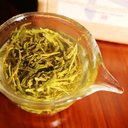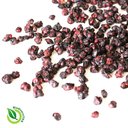Ancient Baked Heart Tea
94
Percentile
3 ratings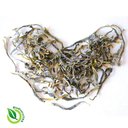 |
|
Commercial Description
Growing at elevations between 6,000-7,200+ feet high on Wu Liang Mountain where most of the year the sun is shining, the tea reflects this in the taste. It is then dried and stored loosely as to not break the short to medium size relatively dark and twisted leaves. The liquor is a light, golden green with a medium body, notes of toasted rice and wildflowers.
Brewing Instructions: (from Wild Tea Qi)
180°F, 1 teaspoon or 1-3 grams per 4 ounces water, 6 seconds and 4 seconds second brew.
Ratings & Reviews
Page 1 of 1 page with 3 reviews
 83 Aroma: 8/10 Flavor: 5/5 Value: 3/5
83 Aroma: 8/10 Flavor: 5/5 Value: 3/5homais (21 reviews) on Apr. 27th, 2013
Every tea I've had from this company has been singular, more of a fascinatingly complex taste experience that warrants attention and a little bit of ceremony than an 'everyday' tea. This one was no different. And like the other green teas I've tried from this company, it stays tasty and interesting for more infusions than I usually get out of green teas - I brewed this one in a gaiwan at 180 degrees, very short infusions, and got five cups out of it, though the last one was starting to turn acrid on me.
The dry leaves had a very slight vegetal smell, which intensified considerably upon brewing and picked up a pungent herbal quality as well, like a much grassier kind of sage or hyssop.
The taste developed and shifted from infusion to infusion, but what stayed constant throughout was a kind of refreshing sourness - tangy would be another word - that makes it a very good 'cooling' and invigorating tea that leaves a very faint but pleasant buzzing sensation in my mouth, similar to the effect of, say, thyme tea.
The early cups brewed a very pale jade and tended to be vegetal and lavendar-like with a more pronounced tang, and later cups turned progressively more golden in color and picked up a grassy flavor.
The experience left me almost giddily invigorated, despite the tea not seeming to have an especially high caffeine content. As I said in the beginning, definitely not an everyday sort of tea, but an impressive one, and very fun to share with others.
 91 Aroma: 8/10 Flavor: 5/5 Value: 5/5
91 Aroma: 8/10 Flavor: 5/5 Value: 5/5Alex Zorach (1453 reviews) on Mar. 21st, 2013
I'm not hugely experienced with Yunnan green teas, but I tend to find them very interesting, and this one was no exception. This tea really amazed me with its ability to deliver infusion after infusion...the leaves seem to hold so much flavor!
Dry leaf is a mix of dark golden green and pale whitish leaves, and has a warm, toasted aroma.
Upon brewing, produces a mellow cup with an aroma that is both toasty and vegetal. Like some Yunnan green teas, this was reminiscent of some Himalayan teas, including greens and oolongs from Darjeeling and nearby regions. Wild Tea Qi says that this is a high-grown (6000-7200 feet) tea, and I wonder if what I'm noticing is a similarity due to the effect of elevation. Slightly suggestive of asparagus or stewed spinach, especially in the first cup.
Very smooth, but there's a slight lingering astringency at the bottom of the cup; later cups have a little more.
Impressively, the second cup is just as good as the first, if not better. There are some grassy tones that were completely absent in the first cup, as well as some orchid-like floral qualities. The second cup is more tangy, and has a suggestion of celery in the finish.
Brewing with longer steepings, I was able to brew three very flavorful cups, and there was still some flavor left after that.
This isn't exactly what I'd consider an everday tea, but it was priced very reasonably. I thought it offered exceptional value because of how much flavor I was able to stretch from the leaves by brewing them over and over. It's a bit peculiar, but always interesting.
Page 1 of 1 page with 3 reviews
More Teas from China from Wild Tea Qi
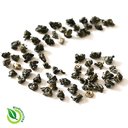
Ancient Artisan Bi Luo Chun Green Tea
| Style: | Bi Luo Chun |
| Region: | Dali, Yunnan, China |
| Caffeine: | Caffeinated |
| Leaf: | Loose |
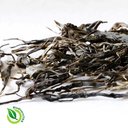
Mengku Rich Valley Raw Puer Tea
| Style: | Raw (Sheng) Pu-erh |
| Region: | Shuangjiang, Yunnan, China |
| Caffeine: | Caffeinated |
| Leaf: | Loose |
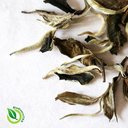
Ancient Artisan Moonlight White Tea
| Style: | Moonlight White |
| Region: | Yunnan, China |
| Caffeine: | Caffeinated |
| Leaf: | Loose |


